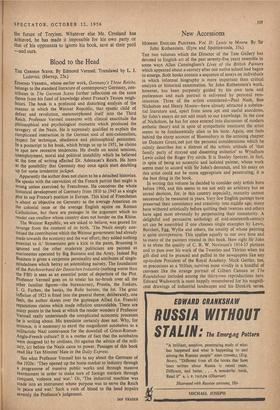Blood to the Head
THE GERMAN SCENE. By Edmond Vermeil. Translated by L. J. Ludovici. (Harrap, 25s.) EDMOND VERMEIL, whose earlier work, Germany's Three Reichs, belongs to the standard literature of contemporary Germany, con- tributes in The German Scene further reflections on the same theme from his fund of knowledge about France's Teuton neigh- bours. The book is a profound and disturbing analysis of the manner in which the Weimar Republic, that spastic child of defeat and revolution, metamorphosed itself into the Third Reich. Professor Vermeil measures with clinical exactitude the philosophical and psychological moments which produced the savagery of the Nazis. He is supremely qualified to explain the complicated interaction in the German soul of anti-rationalism, respect for technique, obedience and philosophical pessimism. In a postscript to his book, which brings us up to 1951, he claims to spot new recessive tendencies. He dwells on social tensions, unemployment, moral and political instability which he believed at the time of writing affected Dr. Adenauer's Reich. He hints at the possibility that Germany may once again start doubling up for some irredentist jackpot.
Apparently the author does not claim to be a detached historian. He speaks with the conviction of the French patriot that might is wrong unless exercised by Frenchmen. He conceives the whole historical development of Germany from 1810 to ,I945 as a single plot to sap France's position in Europe. This kind of Frenchman is about as objective on Germany as the average American on the colonial issue or the average English squire on Roman Catholicism, but there are passages in the argument which no reader can swallow whose country does not border on the Rhine.
The Weimar Republic, we are asked to believe, was geared for revenge from the moment of its birth. 'The Nazis simply con- tinued the contribution which the Weimar government had already made towards the economy and the war effort; they added nothing essential to it.' Stresemann gets a kick in the pants, Bruening is ignored and the other moderate politicians are painted as marionettes operated by Big Business and the Army. Indeed Big Business is given a corporate personality and attributes of single. mindedness which betray an astonishing naivety. The foundation of the Reichsverband der Deutschen Industrie (nothing worse than the FBI) is seen as an essential point of departure of the Plot. Professor Vermeil goes on to smear his tar-brush over all the other familiar figures—the bureaucracy, Prussia, the Junkers, I. G. Farben, the banks, the Ruhr barons; the lot. The great inflation of 1923 is fitted into the general theme; deliberately, one feels, the author skates over the grotesque Allied (i.e. French) reparations claims which made inflation unavoidable. There are many points in the book at which the reader wonders if Professor Vermeil really understands the complicated economic processes he is writing about. His translator certainly does not. Why, for instance, is it necessary to enrol the magnificent autobahns as a militaristic Nazi connivance for the downfall of Greco-Roman- Anglo-French culture? It is a matter of fact that the autobahns were designed (a) by civilians, (b) against the advice of the mili- tary, (c) before the Nazis carne to power. Passages of this book read like Ten Minutes' Hate in the Daily Express.
See what Professor Vermeil has to say about the Germans of the 1920s: 'They opened up the home market to industry through a programme of massive public works and through massive rearmament in order to make sure of foreign markets through conquest, violence and war.' Or, 'The industrial machine was made into an instrument whose purpose was to serve the Reich in peace and war.' Such a rush of blood to the head impairs severely the Professor's judgement.
IAN FRASER










































 Previous page
Previous page